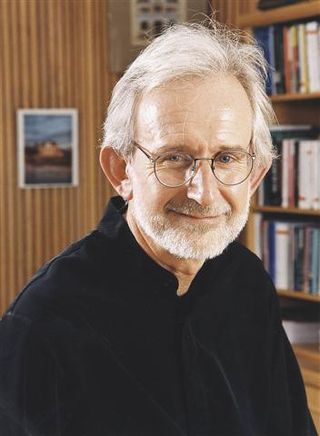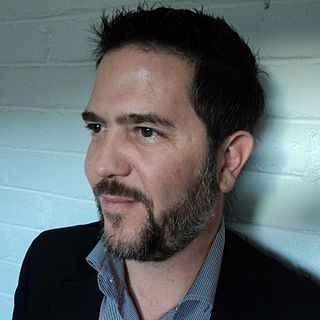
The University of Cape Town (UCT) is a public research university in Cape Town, South Africa. Established in 1829 as the South African College, it was granted full university status in 1918, making it the oldest university in South Africa and the oldest university in Sub-Saharan Africa in continuous operation.
Njabulo Simakahle Ndebele is an academic and writer of fiction who is the former vice-chancellor and principal of the University of Cape Town (UCT). On 16 November 2012 he was inaugurated as the chancellor of the University of Johannesburg.

Flemming Rose is a Danish journalist, author and Senior Fellow at the Cato Institute. He previously served as foreign affairs editor at the Danish newspaper Jyllands-Posten. As culture editor of the same newspaper, he was principally responsible for the September 2005 publication of the cartoons that initiated the Jyllands-Posten Muhammad cartoons controversy early the next year, and since then he has been an international advocate of the freedom of speech.
Max Price is a former vice-chancellor and principal of the University of Cape Town (UCT) in South Africa. He succeeded Njabulo Ndebele and held this position for 10 years from 19 August 2008 until 30 June 2018.

Martin Hall is a British-South African academic and educationalist who has written extensively on South African history, culture and higher education policy. He is a former Vice Chancellor of the University of Salford and is currently serving as the acting Deputy Vice-Chancellor (DVC): Transformation at the University of Cape Town.
The Chancellor of the University of Cape Town (UCT) is the ceremonial head of the university, representing it in the public sphere and conferring degrees in its name. The Chancellorship is a titular position; the chief executive of the university is the Vice-Chancellor. The current Chancellor, the sixth since UCT was elevated to university status in 1918, is Precious Moloi-Motsepe. She is succeeding Graça Machel, the wife of South African ex-President Nelson Mandela who served as chancellor from 1999 until 2019. If there are multiple nominations the Chancellor is chosen by an electoral college representing staff, students and graduates. Formerly Chancellors were appointed for life, but since 1999 they are appointed for a renewable ten-year term.

Jacques André Rousseau is a South African academic, secular activist and social commentator.

Rosina Mamokgethi Phakeng is a South African professor of mathematics education who in 2018 became a vice-chancellor of the University of Cape Town (UCT). She has been the vice principal of research and innovation, at the University of South Africa and acting executive dean of the College of Science, Engineering and Technology at UNISA. In 2018 she was an invited speaker at the International Congresses of Mathematicians. In February 2023 it was announced that she would leave her position as vice-chancellor of UCT and take early retirement. She was succeeded by Professor Daya Reddy on 13 March 2023
Edward Roworth was a South African artist.
The Vice-Chancellor of the University of Cape Town (UCT) is the executive head also referred to as the principal. The VC has the overall responsibility for the policy and administration of the University. The last Vice-Chancellor, the tenth since UCT was elevated to university status in 1918, was Mamokgethi Phakeng.

University of Cape Town Libraries is the library system of the University of Cape Town in Cape Town, South Africa.

Rhodes Must Fall was a protest movement that began on 9 March 2015, originally directed against a statue at the University of Cape Town (UCT) that commemorates Cecil Rhodes. The campaign for the statue's removal received global attention and led to a wider movement to "decolonise" education across South Africa. On 9 April 2015, following a UCT Council vote the previous night, the statue was removed.
Chumani Maxwele is a South African political activist best known for his involvement in the Rhodes Must Fall and the #FeesMustFall movements. Maxwele first gained prominence in 2010 after his wrongful arrest and interrogation for allegedly giving an obscene hand gesture to President Jacob Zuma's presidential motorcade convoy in Cape Town city traffic.

#FeesMustFall was a student-led protest movement that began in mid-October 2015 in South Africa. The goals of the movement were to stop increases in student fees as well as to increase government funding of universities. Protests started at the University of Witwatersrand and spread to the University of Cape Town and Rhodes University before rapidly spreading to other universities across the country. Although initially enjoying significant public support the protest movement started to lose public sympathy when the protests started turning violent.
The Mafeje affair refers to anti-government protests by South African students in 1968 in response to a decision of the council of the University of Cape Town (UCT) to rescind anthropologist Archie Mafeje's job offer for a senior lecturer position due to pressure from the South African apartheid government. The protests were followed by a nine-day sit-in at the university's administration building.
Jeremy Seekings is a British-born academic who is professor of political studies and sociology at the University of Cape Town. He is the director of the university's Centre for Social Science Research.

Stuart John Saunders was a South African academic and vice-chancellor of the University of Cape Town from 1981 to 1996. He was known for his role "in ensuring that the spirit and values of a liberal education survived in South Africa before 1994, and since 1994."
The annual TB Davie Memorial Lecture on academic freedom was established by University of Cape Town to commemorate the work of Thomas Benjamin Davie, vice-chancellor of the university from 1948 to 1955 and a defender of the principles of academic freedom.









